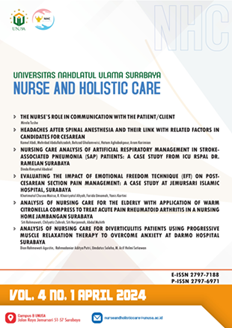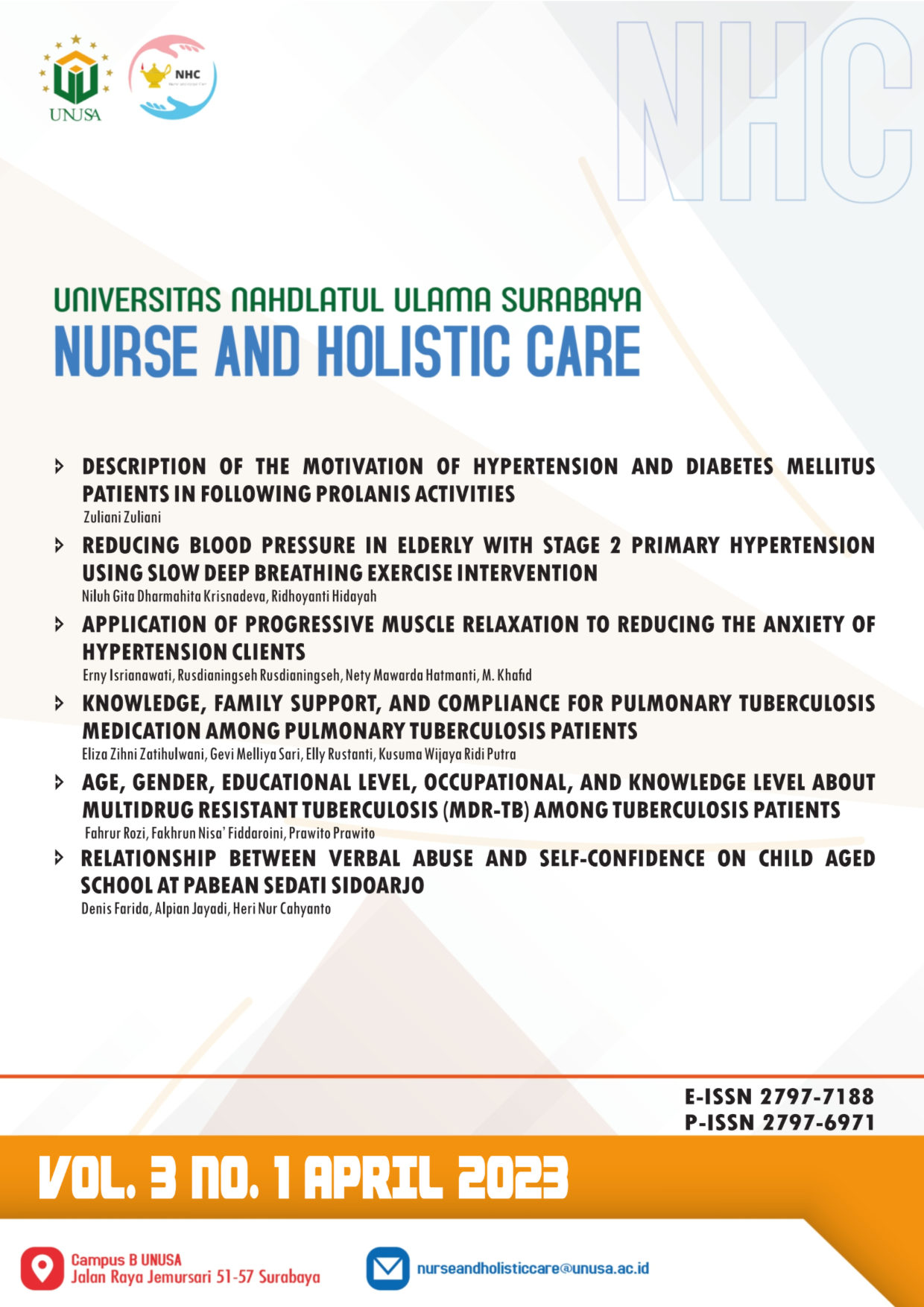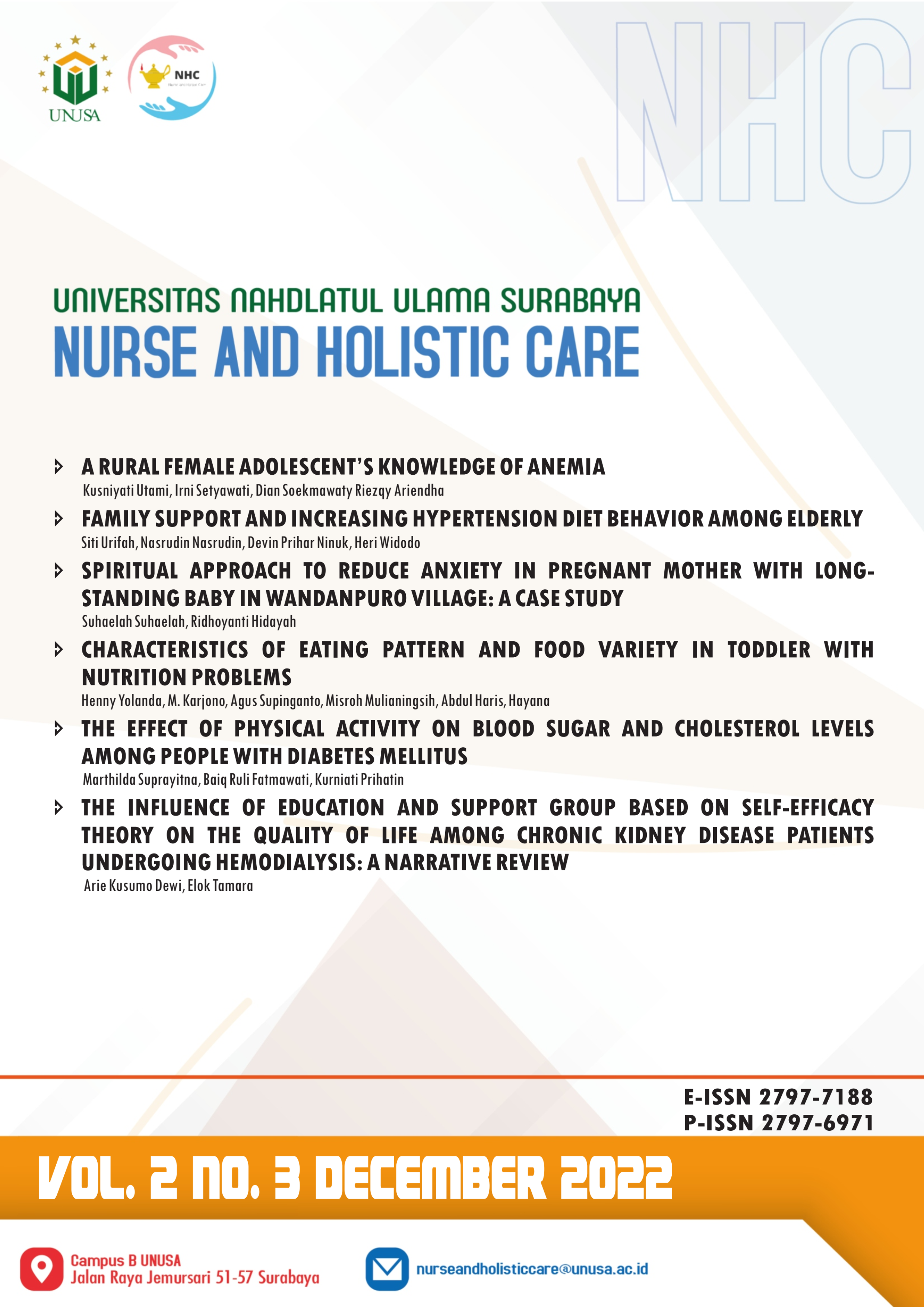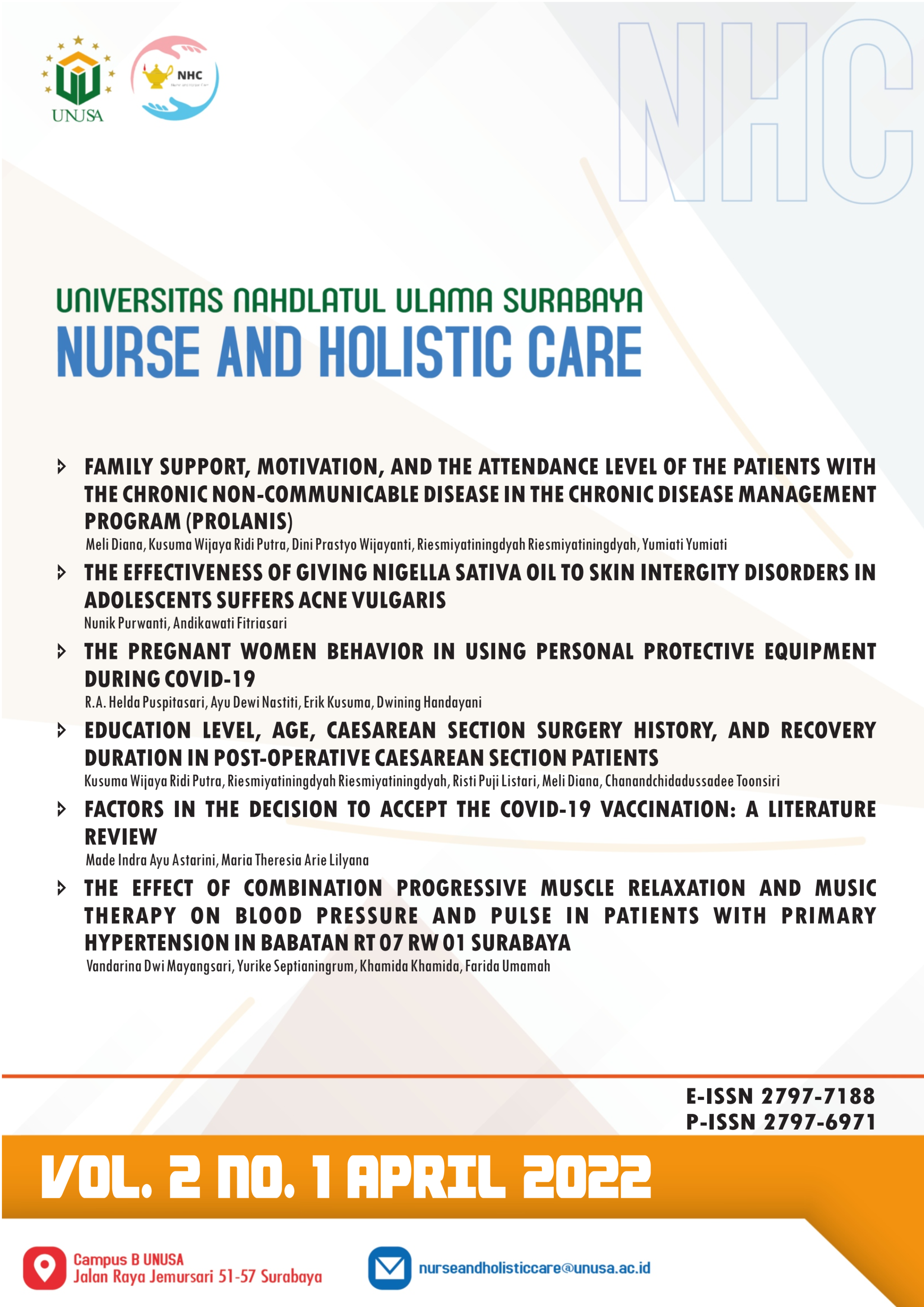Nurse and Holistic Care
Vol. 4 No. 1 (2024)
This issue presents various analyses and innovations in nursing practices, focusing on pain management, communication, and non-pharmacological therapies. The articles cover diverse topics, including the critical role of nurses in effective communication with patients and managing pain and anxiety using therapeutic methods such as Emotional Freedom Technique (EFT) and progressive muscle relaxation.
Some studies address specific nursing challenges, such as headaches following spinal anesthesia in cesarean section patients, artificial respiratory management in stroke-associated pneumonia in ICU settings, and rheumatoid arthritis pain relief through warm citronella compresses. Additionally, the issue explores anxiety management in diverticulitis patients using progressive muscle relaxation therapy.
Case studies conducted in healthcare facilities like Jemursari Islamic Hospital, RSPAL Dr. Ramelan, and Darmo Hospital, Surabaya, highlight the practical application of these innovative approaches to enhance patient care and quality of life. Overall, this issue makes a valuable contribution to the advancement of nursing science, emphasizing both the physical and psychological needs of patients.
The articles in this issue were contributed by authors and co-authors from Albania, Iran, Indonesia
Nurse and Holistic Care
Vol. 3 No. 3 (2023)
This issue features diverse studies focused on advancing healthcare practices and nursing interventions for various patient populations. The articles include the development and validation of the Adolescents' Knowledge about Stress and Depression Questionnaire (AKSDQ), providing a reliable tool to assess adolescents' understanding of mental health. A comparative study examines the impact of exclusive versus non-exclusive breastfeeding on the body weight of infants aged 6 to 12 months, offering insights into maternal and child health practices.
Nursing care analyses are also highlighted, including the use of effective cough techniques and chest physiotherapy in tuberculosis patients to improve respiratory function, and the application of thermotherapy for managing acute pain in acute coronary syndrome patients in ICU settings. Additionally, the issue explores the use of audiovisual methods for educating pregnant women on anemia prevention through iron tablet consumption and the application of simple inhalation therapy for pulmonary TB patients to enhance airway clearance.
These studies demonstrate innovative approaches and practical solutions for improving health outcomes, contributing valuable knowledge to nursing and healthcare practices.
The articles in this issue were contributed by authors and co-authors from Indonesia
Nurse and Holistic Care
Vol. 3 No. 2 (2023)
This issue encompasses a range of studies highlighting critical aspects of healthcare, nursing care, and public health. The relationship between parenting styles and difficult eating behaviors in pre-school children is explored, providing valuable insights for improving child nutrition and development. Additionally, the role of nurses in empowering parents to care for children with cancer is examined, emphasizing the importance of effective communication and information sharing in pediatric care.
In nursing practice, the use of a simple bell alarm is analyzed for its impact on job satisfaction among nurses in the resuscitation room of emergency departments. The application of brisk walking exercise as part of family nursing care for hypertension patients is presented, showcasing its potential to improve health management. Spiritual support for patients with synovial sarcoma during the grief and loss process is also discussed, underlining the significance of holistic care.
Moreover, a public health study assesses antinutrients like nitrate, phytate, oxalate, and cyanide in commonly consumed herbal snuffs in Sokoto, Nigeria, raising awareness of potential health risks. These articles collectively contribute to advancing knowledge and practices in healthcare and nursing, addressing both physical and emotional well-being.
The articles in this issue were contributed by authors and co-authors from Indonesia, Nigeria
Nurse and Holistic Care
Vol. 3 No. 1 (2023)
This issue features a collection of studies exploring various health and behavioral challenges across different populations. It examines the motivation of patients with hypertension and diabetes mellitus to participate in Prolanis (a chronic disease management program), shedding light on factors that encourage consistent engagement. A study on slow deep breathing exercises demonstrates their effectiveness in reducing blood pressure among elderly patients with stage 2 primary hypertension, highlighting a non-pharmacological intervention for better health outcomes.
The application of progressive muscle relaxation is explored as a technique to alleviate anxiety in hypertension clients, showcasing its potential in managing stress-related conditions. Additionally, the role of knowledge, family support, and medication compliance is analyzed among pulmonary tuberculosis patients, emphasizing the importance of a supportive environment in treatment success.
Further, the issue investigates factors such as age, gender, education, occupation, and knowledge in relation to multidrug-resistant tuberculosis (MDR-TB), providing critical insights for improving awareness and preventive strategies. Lastly, the relationship between verbal abuse and self-confidence in school-aged children is examined, underlining the psychological impact of negative communication on children's development.
These studies collectively contribute to advancing healthcare practices and psychosocial understanding, offering evidence-based solutions to improve physical, emotional, and social well-being across diverse populations.
The articles in this issue were contributed by authors and co-authors from Indonesia
Nurse and Holistic Care
Vol. 2 No. 3 (2022)
This issue presents diverse research addressing critical health concerns in various populations. It explores rural female adolescents' knowledge of anemia, emphasizing the need for targeted educational interventions to improve awareness and prevention. The role of family support in encouraging dietary adherence among elderly individuals with hypertension is also highlighted, demonstrating its importance in managing chronic conditions.
A case study examines the use of a spiritual approach to alleviate anxiety in pregnant women with long-standing pregnancies, underscoring the value of holistic care. Research into the eating patterns and food variety of toddlers with nutritional problems provides insights into dietary factors influencing child health.
The impact of physical activity on blood sugar and cholesterol levels among diabetes mellitus patients is analyzed, reinforcing the benefits of exercise in managing metabolic health. Additionally, a narrative review investigates the effects of education and support groups based on self-efficacy theory on the quality of life of chronic kidney disease patients undergoing hemodialysis, showcasing the potential of psychosocial support in improving patient outcomes.
Together, these studies contribute valuable knowledge to public health, clinical care, and nursing practices, addressing both physical and psychological well-being across diverse populations.
The articles in this issue were contributed by authors and co-authors from Indonesia
Nurse and Holistic Care
Vol. 2 No. 2 (2022)
This issue brings together studies that explore innovative approaches and perceptions in healthcare to improve physical and emotional well-being across diverse populations. The comparison of relaxation and distraction techniques in circumcision patients reveals effective strategies for reducing anxiety during medical procedures. Similarly, deep relaxation techniques are studied as an intervention to alleviate moderate anxiety in first-time mothers during the postpartum taking-in phase, emphasizing the role of relaxation in maternal care.
Nurses' perceptions of implementing the "Five Moments of Hand Washing" are analyzed, providing insights into adherence to infection prevention protocols. Additionally, the benefits of sunbathing for enhancing sleep quality among the elderly are highlighted, showcasing a natural and simple intervention for promoting restful sleep.
A cross-sectional study examines the demographic characteristics and independence in daily activities of elderly residents in nursing homes, shedding light on factors affecting their quality of life. Lastly, the relationship between self-efficacy and blood glucose levels in diabetes mellitus patients is explored, emphasizing the psychological factors influencing effective diabetes management.
These studies collectively contribute to advancing healthcare practices by addressing anxiety, hygiene, sleep quality, independence, and self-management, offering valuable insights for improving care and outcomes across varied populations.
The articles in this issue were contributed by authors and co-authors from Indonesia
Nurse and Holistic Care
Vol. 2 No. 1 (2022)
This issue explores a range of studies addressing key health concerns and interventions aimed at improving patient care and outcomes across various settings. One study focuses on the role of family support, motivation, and patient attendance in the Chronic Disease Management Program (Prolanis) for patients with chronic non-communicable diseases, highlighting factors that influence patient engagement and program success.
Another study evaluates the effectiveness of Nigella Sativa oil in treating skin integrity disorders, particularly acne vulgaris, in adolescents, offering insights into alternative treatments for dermatological issues. The behavior of pregnant women in using personal protective equipment during the COVID-19 pandemic is also examined, shedding light on health precautions taken during pregnancy amidst the global health crisis.
Further, the issue looks into factors influencing recovery in post-operative cesarean section patients, such as education level, age, surgery history, and recovery duration, providing a comprehensive view of post-surgical care. A literature review on the factors influencing COVID-19 vaccination acceptance explores the complex decision-making processes behind vaccination uptake.
Lastly, the impact of combining progressive muscle relaxation and music therapy on blood pressure and pulse in patients with primary hypertension is assessed in a study from Babatan, Surabaya, offering a non-pharmacological approach to managing hypertension.
These studies provide valuable insights into improving patient care, promoting health behaviors, and managing chronic conditions, contributing to the enhancement of healthcare practices.
The articles in this issue were contributed by authors and co-authors from Indonesia, Thailand
Nurse and Holistic Care
Vol. 1 No. 3 (2021)
This issue presents studies focusing on public health, patient safety, and the well-being of various populations. One study examines the impact of health education on increasing community awareness and preventive behaviors to combat Dengue Hemorrhagic Fever, emphasizing the importance of education in disease prevention. Another article provides a literature review on the benefits of spirituality for the elderly, highlighting how spiritual practices can contribute to improved mental and emotional health in older adults.
The issue also features a literature review on internal and external factors influencing the implementation of patient safety goals, shedding light on challenges and strategies for enhancing patient safety in healthcare settings. The prevalence of alcohol consumption in hypertension patients at the Gleno Inpatient Public Health Center in Timor-Leste is analyzed, revealing the relationship between lifestyle choices and hypertension management.
Additionally, the determinants of health protocol implementation among elderly individuals with chronic diseases in Jember are explored, providing insights into barriers and enablers of effective health interventions. Lastly, the impact of unplanned pregnancies on adolescents is reviewed, underlining the emotional, physical, and social consequences of unintended pregnancies in young populations.
Together, these studies contribute valuable knowledge to improving healthcare practices, disease prevention, patient safety, and the quality of life for various demographic groups.
The articles in this issue were contributed by authors and co-authors from Indonesia, Timer Leste
Nurse and Holistic Care
Vol. 1 No. 2 (2021)
This issue presents studies focusing on public health, patient safety, and the well-being of various populations. One study examines the impact of health education on increasing community awareness and preventive behaviors to combat Dengue Hemorrhagic Fever, emphasizing the importance of education in disease prevention. Another article provides a literature review on the benefits of spirituality for the elderly, highlighting how spiritual practices can contribute to improved mental and emotional health in older adults.
The issue also features a literature review on internal and external factors influencing the implementation of patient safety goals, shedding light on challenges and strategies for enhancing patient safety in healthcare settings. The prevalence of alcohol consumption in hypertension patients at the Gleno Inpatient Public Health Center in Timor-Leste is analyzed, revealing the relationship between lifestyle choices and hypertension management.
Additionally, the determinants of health protocol implementation among elderly individuals with chronic diseases in Jember are explored, providing insights into barriers and enablers of effective health interventions. Lastly, the impact of unplanned pregnancies on adolescents is reviewed, underlining the emotional, physical, and social consequences of unintended pregnancies in young populations.
Together, these studies contribute valuable knowledge to improving healthcare practices, disease prevention, patient safety, and the quality of life for various demographic groups.
The articles in this issue were contributed by authors and co-authors from Indonesia
Nurse and Holistic Care
Vol. 1 No. 1 (2021)
This issue presents a variety of studies focusing on health, development, and well-being across different age groups. One study assesses the reliability of a modified questionnaire for measuring anemia knowledge levels in adolescents, providing a valuable tool for understanding and addressing anemia awareness in youth. Another article highlights the impact of playing throw and catch ball on improving gross motor development in preschool-aged children, emphasizing the role of play in early childhood development.
The issue also explores the effect of guided imagery therapy on reducing anxiety levels in patients with type 2 diabetes mellitus, offering an alternative, non-pharmacological intervention to manage anxiety. Additionally, the effect of positive emotional regulation on the happiness levels of menopausal women is examined, shedding light on how emotional well-being can be improved during this life stage.
A study on the relationship between anxiety and sleep quality in the elderly reveals how anxiety can negatively impact sleep, an essential aspect of aging well. Lastly, the effectiveness of acupuncture in improving muscular strength in stroke patients is explored, presenting acupuncture as a potential complementary therapy in stroke rehabilitation.
These studies collectively contribute to advancing knowledge on improving physical, mental, and emotional health, providing insights that can inform healthcare practices and interventions for diverse populations.
The articles in this issue were contributed by authors and co-authors from Indonesia










